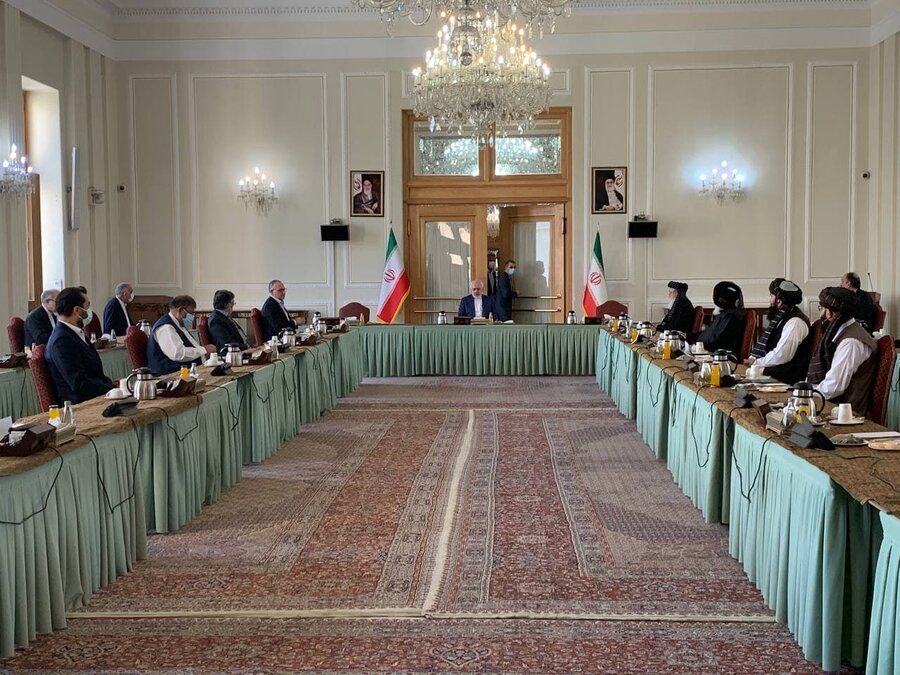Speaking in an interview with the website of the Strategic Council on Foreign Relations, Dr. Ahmad Bakhshi said that today’s problems in Afghanistan are due to the failure of domestic agents in their plans and failure of the powers involved in the state-building in that country, adding: Although the issue of state-building has been raised since 2001; the government basically had no influence in parts of Afghanistan, and the influence of some regional planners was greater than the power of the government in those areas.
He described the current situation in Afghanistan as a result of US negotiations with the Taliban and said: In those negotiations, which took place with putting aside the government, the role of the Taliban in the future government in that country was recognized. In addition to those talks, the Taliban held talks with countries in the region, and they saw themselves as an influential and legitimate group.
Referring to John Bolton’s dissatisfaction with the Taliban’s accountability in the book “The Room Where It Happened”, the professor added: Withdrawal of US troops and the Taliban’s rise to power in state-building, along with the existence of an inefficient government, elimination of jihadist forces and influential groups and differences among them, have created those conditions. The United States sought to withdraw from Afghanistan even without an agreement being reached, and with the role it has given to the Taliban, the group has taken the upper hand.
Bakhshi referred to the Taliban’s claims that it controls 83 percent of Afghanistan’s territory and continued: Today in Afghanistan, “war” as a method of gaining power is no longer the answer, and the issue of state-building must be negotiated; but because of the central government’s failure to play a proper role and the US unilateral agreement with the Taliban, as well as the power vacuum that Taliban feel can fill, we see the situation today.
Emphasizing that the record of the central government after 20 years is not a positive record, he said: Certainly, solving the problems of Afghanistan requires internal, regional and international consensus. In this direction, Afghanistan’s neighboring countries and in general the structures of the region involved in it should emphasize peace-building and internal consensus, and considering the poor record of the government, pay attention to the infrastructure that the government has formed and the achievements that have been made.
Regional countries must seek consensus
The international affairs analyst added that the countries of the region should seek consensus and not consider their own interests in the work of the groups. In fact, all developments must be seen together and with regional security in mind to contribute to peace in Afghanistan. Peace in that country is not achieved by eliminating different groups, and it is necessary to provide a basis for the participation of all groups, given the ethnic mosaic, religious issues and its social realities.
Need to pay attention to consequences of the situation in Afghanistan
Bakhshi emphasized: The consequences of this situation should be considered by the countries of the region; because with the civil war in Afghanistan, we will see insecurity, which, while delaying the reconstruction of that country, will lead to widespread migration. Afghanistan will become a haven for extremist and terrorist groups that, in addition to the insecurity and special problems it poses to the lives of the people of that country, highlights issues related to the export of terrorism, given the conditions in Central Asia. This situation is definitely not in anyone’s interest.
At the same time, while stressing that a secure Afghanistan can be a crossroads for economic exchanges and create added value for the country and the region, he said: In the current situation, given the missed opportunities in Afghanistan, unfortunately the situation is very complicated and cannot be expected to be solved easily.
The professor added: About four years after announcing the overthrow of the Taliban, the Americans faced the emergence of this group and gradually accepted them as a fact!
Referring to the Pakistani Interior Minister’s welcome to the Taliban coming to power in Afghanistan provided that they do not act so extremist that could revive the Pakistani Taliban, Bakhshi said: We should not be contradictory and consider good and bad only from our point of view. It is true that the Taliban are part of Afghan society, but the more problems are solved in that country, the longer this presence and activity will last. We will see such cases as long as the national reconciliation is delayed.
Creating security, lack of instrumental view to groups in Afghanistan, two basic principles
He said regional co-operation should be based on the two basic principles of “creating security” as well as “lack of using Afghan groups as tools”.
The international affairs expert stressed that the talks should be in consensus and in coordination with the government of national reconciliation, adding: The Taliban feel that it is part of the puzzle to solve the problem of Afghanistan and should not be left out. On the other hand, the scenarios that the countries of the region are considering for peace in Afghanistan should include all and should be accepted that benefit of all is in peace and security with the participation of all ethnic groups.
Role of regional organizations
Bakhshi also considered some analysis on the possibility of disintegration of Afghanistan and the emergence of federalism in that country as noteworthy and stressed the need for attention and sensitivity of the countries in the region to its consequences.
He said that after 20 years, the United States could not take any positive action in Afghanistan, and today’s situation shows the inefficiency of their policies and the decline of the country’s power and considered the further role of China and Russia in Afghanistan very likely and said: In this context, the role of regional organizations such as Shanghai in ensuring regional security and opposing unilateralism should be highlighted.










0 Comments